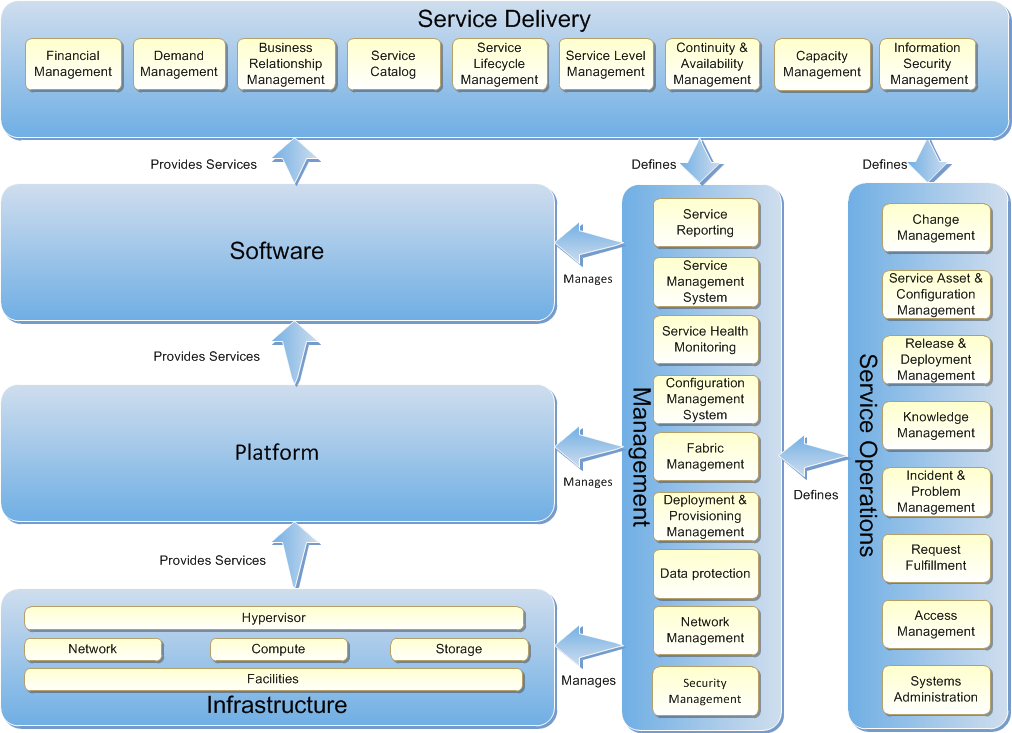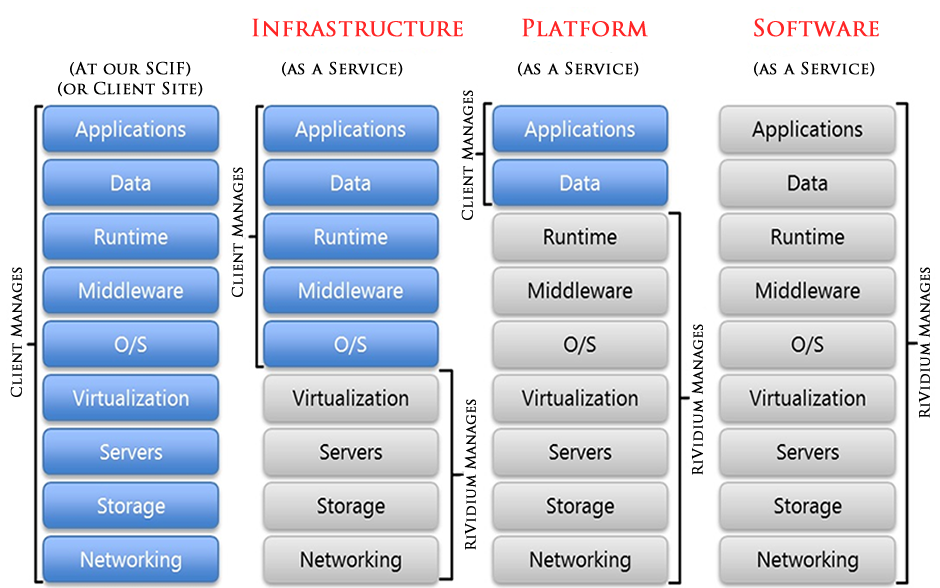
The National Institute of Standards and Technology (NIST) defines cloud computing as a model for enabling ubiquitous, convenient, on-demand network access to a shared pool of configurable computing resources (e.g., networks, servers, storage, applications, and services) that can be rapidly provisioned and released with minimal management effort or service provider interaction. This cloud model is composed of five essential characteristics, three service models, and four deployment models.
RiVidium uses Microsoft's Cloud Reference Model (see figure below) to define the scope and the problem space for its domain. The model acts as the “guide” to assist us in holistically addressing the development of all our cloud architecture deployments. Additionally, it provides a common vocabulary and shared understanding across all constituencies.
This Reference Model forms the basis, or cornerstone, for all Reference Architecture in our Cloud Delivery. It not only defines the domain but also sets the taxonomy and drives coherency of approach amongst the many architects who contribute to the Cloud Reference Architecture. The Reference Model splits into the following layers:
- The Software, Platform, and Infrastructure Layers represent the technology stack, where each provides services to the layer above.
- The Service Operations and Management Layers represent the process perspective, and include the management tooling required to implement aspects of the process.
- The Service Delivery Layer represents the alignment between business and Information Technology (IT).

RiVidium uses the reference model to overlay the three cloud computing service models for deployment in a private, public or hybrid cloud. The three service models we support are:
- Software as a Service (SaaS)
- Platform as a Service (PaaS)
- Infrastructure as a Service (IaaS)

Below you will find the capabilities we provide for each model:
SaaS
The capability provided to the client is the ability to use RiVidium’s applications that run on a cloud infrastructure. The applications are accessible from various client devices through either a thin client interface, such as a web browser (web-based email) or a program interface. The client does not manage or control the underlying cloud infrastructure including network, servers, operating systems, storage, or even individual application capabilities, with the possible exception of limited, user-specific application configuration settings.
The Enterprise Software provide by RiVidium in this model are:
- Microsoft Exchange 2013 as a Service
- Microsoft SharePoint 2013 as a Service
- Testing as a Service
- Human Resource as a Service
- Customer Relationship Management as a Service
PaaS
The capability provided to the client is to deploy onto the cloud infrastructure client-created or acquired applications created using programming languages, libraries, services, and tools supported by the RiVidium. The client does not manage or control the underlying cloud infrastructure including network, servers, operating systems, or storage, but has control over the deployed applications and possibly configuration settings for the application-hosting environment.
The Platform capabilities provide by RiVidium in this model are:
- Microsoft Visual Studio 2008-2012 Team Foundation for Architects
- Microsoft SQL Server 2008-2012
- MSDN Libraries and SDKs
- IIS server
- Eclipse IDE for Java EE Developers
- MySql
- Apache Tomcat
- Hybernate
- Ruby, Drupal, Android SDK
IaaS
The capability provided to the client is the ability to provide processing, storage, networks, and other fundamental computing resources, allowing the consumer to deploy and run arbitrary software, which can include operating systems and applications. The consumer does not manage or control the underlying cloud infrastructure but has control over operating systems, storage, and deployed applications; additionally, there exists the possibility of limited control of select networking components (host firewalls).
The Infrastructure capabilities provide by RiVidium in this model are:
- Support for UNIX, LINUX, BSD
- Support for all Windows OS
- Support for Oracle 11g and Microsoft SQL
- Support for storage and data backup
- Split T1 internet support
- Firewall, UPS and cooling support
- Mirroring and clustering